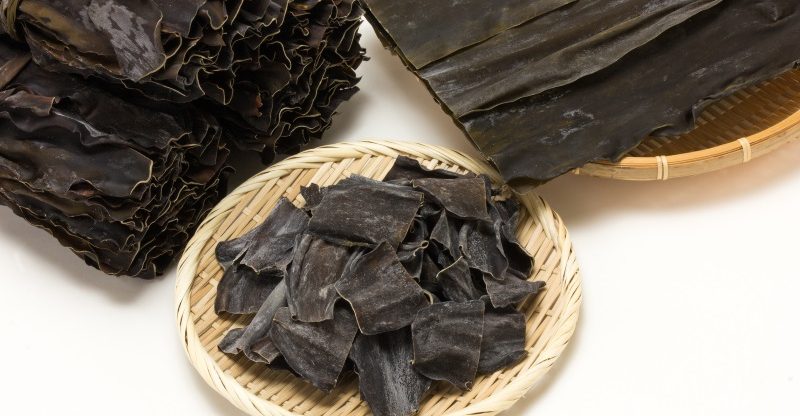11 Evidence-Based Health Benefits of Kelp
You now hear a lot about “superfoods” in the media.
Kelp is quickly becoming a favorite in this category.
The people of Japan and China have long known been aware of the nutritional benefits of eating kelp.
You can now enjoy these same benefits to improve your health.
Kelp, a type of seaweed, is a powerful source of essential vitamins and minerals.
It can help you to treat and even prevent many chronic diseases, including cancer.
Keep reading to learn more about what makes this superfood so amazing.
Understanding Kelp
Kelp is a type of seaweed, that belongs to the brown algae class of plants.
Kelp differs from other types of seaweed in that is grows in dense, underwater forests in shallow waters, where it can enjoy cool water temperatures.
There are vast kelp forests just off the coasts of northern Asia, Siberia, Alaska, and western North America.
There are over 30 different varieties of kelp that grow around the world, and the nutritional benefit of each varies slightly.
Kelp is an ancient species that first appeared on earth between 5 and 23 million years ago.
It thrives in nutrient-dense waters, which is why it is so rich in nutrients itself.
Kelp is an extremely sustainable source of food.
This underwater plant grows amazingly fast, often growing over 18 inches in just one day.
A single kelp strand can be as long as 260 feet.
Each plant consists of blades, which resembles leaves, stem-like structures called stipes, and a holdfast, which anchors the plant to the ocean floor.
It is worth noting that genetics may play a role in how well you digest the long-chain carbohydrates that are found in seaweed.
For example, those of Japanese descent are more likely to have certain gut bacteria that enhance the digestion of seaweed.
Since diets in these cultures have included eating seaweed for centuries, their genetics allow them to process it more efficiently (1).
Kelp is now grown and harvested commercially, mostly in Asia.
It is used for a variety of purposes, including food.
Kelp is valued because of its high concentrations of essential nutrients.
Kelp is low in fat and is an excellent source of iron, manganese, calcium, magnesium, folate and Vitamin K, as well as iodine (2).
Just one serving of kelp (about 28 grams) has 23 percent of your daily value of Vitamin K, 13 percent of your requirement of folate, and eight percent of your needed magnesium.
You will also get around five percent of your daily value of calcium and iron.
The nutritional profile of any seaweed will vary by its variety, as well as where it grows.
This is because it gets its nutrition from the surrounding waters.
Laminarin is a type of kelp that is known to have high levels of iodine, potassium, magnesium, calcium, and iron (3), while the Gracilaria changii variety contains rich stores of fiber and essential amino acids (4).
One of the reasons kelp is so good for your health is that it contains a complex long-chain polysaccharide (carbohydrate) known as fucoidan.
This component is known to reduce inflammation, act as an antioxidant and help fight cancer (5).
Kelp also contains vanadium, and fucoxanthin, which are linked to lowered blood sugar levels, as well as improved weight management (6, 7).
How does Kelp Improve Health?
Kelp works to improve your health in ways.
For example, the nutrients found in this sea plant are necessary for human health.
The minerals, fiber, lipids, and peptides help to protect the heart, and those who regularly consume seaweed are shown to have improved heart disease markers, reduced oxidative stress, lower levels of inflammation, lower blood pressure and less blood clotting (8).
One of the things that makes kelp a unique food, is that it is a rich source of natural iodine.
This is not found in many natural, unfortified foods. Iodine is necessary for the production of several thyroid hormones.
A deficiency in this element can result in severe medical problems that can affect your overall health and well-being (9).
Some of the compounds found in kelp may even help to kill cancer cells or inhibit their growth, affecting cell growth for this invasive tissue (10).
How to Find and Use Kelp
Kelp supplements are widely available today.
However, their nutritional content will vary.
Read the kelp supplement nutritional labels carefully to determine if the product has the vitamins and minerals that you are looking for.
Kelp supplements come in a variety of forms, including liquid tinctures or extracts, powders or in pill form.
You can also eat kelp.
It is recommended that you do not take more than 225 μg of iodine each day.
It is, therefore, important that you read the label of your iodine supplement or source to determine its iodine concentration since some powders have as much as 200 μg in one serving.
You should only exceed this recommended dosage of iodine if your doctor has specifically recommended higher doses to treat hypothyroidism or some other condition (11).
Sea vegetables, like kelp, absorb their nutrients from the waters in which they live.
It is, therefore, essential that you seek out organic sources of kelp that are harvested in waters free from heavy metal exposure.
Be sure to check where the manufacturer harvests their plants since some areas of the ocean are extremely contaminated with heavy metals.
You should only purchase from reputable manufacturers.
If you are at risk for thyroid cancer or for developing hyperthyroidism, you should consume kelp cautiously.
Your intake should be moderate, so you do not increase your iodine levels too much.
If you want consistent nutrition from kelp, you should take it as a supplement rather than trying to simply eat the plant.
This is because they can vary widely in their nutritional values.
Kelp’s Health Benefits
The unique and high concentrations of minerals and vitamins found in kelp have many benefits for the human body.
As a natural source of antioxidants, kelp is anti-inflammatory and can help protect your heart and brain from damage and oxidative stress.
Kelp can also help to treat and prevent many other diseases, which will be discussed below.
Improves Thyroid Function
One of the most important benefits of eating kelp is for those with low levels of the thyroid hormone.
Hypothyroidism and other thyroid hormone deficiency issues can lead to problems with body temperature, heart rate, and metabolism.
This deficiency is common in older women.
It can cause symptoms like dry skin, constipation, fatigue, and weight gain.
Iodine deficiency during pregnancy can also lead to developmental delays or permanent disorders in children, including mental and cognitive disabilities (12).
Low levels of the thyroid hormone is usually caused by an iodine deficiency.
Therefore, getting plenty of iodine in your diet can help with this problem.
Kelp is high in iodine, which makes it an excellent supplement for those with thyroid problems.
Supplementing with kelp can help restore thyroid function and increase the presence of iodine in the body (13).
Lowers Inflammation
One of the most abundant compounds in kelp is fucoidan, which is a complex carbohydrate.
Fucoidan has been shown to reduce inflammation, including improving levels of all types of inflammatory markers.
In animal trials, fucoidan reduced neurodegeneration caused by oxidative damage and protected neurons from cell loss.
This led to reduced overall inflammation and improved behavior (14).
This research is supported by cell studies, in which fucoidan blocked nitric oxide and prostaglandin production, effectively preventing inflammation.
It also inhibited the production of pro-inflammatory cytokines and protected the inflammatory pathway (15, 16).
Kelp and other sources of fucoidan could become an important treatment option for neurodegenerative diseases that are caused by inflammation, including Alzheimer’s and other forms of dementia (17).
Protects Against Cancer
Fucoidan may also be an essential treatment in the fight against cancer.
In scientific research, this compound has been shown to stop tumor growth and reduce recurrence risk.
For example, in a clinical trial investigating breast cancer recurrence markers, seaweed was shown to reduce this marker by 50 percent in just one month (18).
The fucoidan found in kelp has been shown to stop tumor growth for prostate, colon, and breast cancer cells, in both animal and cell studies (19, 20, 21).
It is believed that this compound activates the immune system and thereby slows tumor growth (22).
The application of fucoidan to tumor cells showed tumor reduction in lung and leukemia cells (23), which means that this compound could be used in the future to treat a wide range of cancers.
Lowers Blood Glucose Levels
For those with Type 2 diabetes, kelp may be able to help you manage your disease more effectively.
Kelp is an excellent source of vanadium, which mimics insulin in the body.
When taken in animal trials, vanadium was able to reduce many common diabetic symptoms, including blood glucose levels, hunger, and thirst (24).
In human trials, taking kelp powder was shown to reduce not only fasting blood sugar levels but also post-meal glucose measurements and fatty acid levels (25).
Taking this supplement can also help improve HDL or “good” cholesterol levels, protecting you from heart disease that is common in those with diabetes (26).
This is supported by other research which showed that taking oral vanadium was able to reduce the fasting glucose levels of Type 1 diabetics by nearly one-third, while also lowering overall cholesterol levels.
In trials, this supplement has yielded no serious adverse effects and only mild diarrhea, that improved with time (27).
Enhances Weight Loss
Kelp is not only rich in nutrients that can help you fight disease, but it also can help to reduce fat tissue and assist you in losing weight.
Kelp contains a compound known as fucoxanthin, which has been shown to promote weight loss, while also enhancing liver function.
One study investigated a specific type of kelp and found that supplements were able to reduce liver fat content, waist size and overall body weight in clinical trials of obese women (28).
The fucoxanthin in kelp is also known to increase the markers associated with weight loss in fat tissues samples of animals who were fed seaweed (29).
Kelp may also help reduce weight because of alginates, which are carbohydrates that are found in the cell walls of algae, like seaweed.
These compounds slow the breakdown of fat by the pancreas, which leads to less fat being absorbed and more being passed out of the body after digestion (30).
This means that alginates act as a lipase inhibitor, which can help you store less fat and lose weight over time.
Treats Various Viruses
The fucoidan found in kelp may also help to combat several viruses that can cause serious disease.
For those with chronic hepatitis- C, fucoidan was shown to decrease levels of the HCV virus in the blood after ten months of treatment (31).
Patients in this same trial also had a decrease in their alanine aminotransferase levels, which is a protein associated with severe infection by HCV.
In animal trials, fucoidan was able to inhibit the growth of the HSV-1 virus, which causes herpes simplex type 1.
Animals showed increased antibody production, leading to improved immune system response to this pathogen (32).
Further research could supply more evidence of the mechanism of effects, as well as show how kelp and other sources of fucoidan could help treat viruses that cause deadly diseases.
Enhances Brain Health
Diseases like Parkinson’s cause premature cellular death for neurons.
Kelp and other seaweed extracts have been tested in cell models.
They show promise for protecting brain cells from cell death from diseases like Parkinson’s (33).
Strengthens Bones
Kelp can also help to protect your bones and keep them strong.
Bones rely on healthy blood vessels to send necessary minerals and help repair damaged tissue.
The fucoidan in seaweed can help to create new and healthy vessels in your bones (34).
Fucoidan also increases the production of osteoblasts, which are the cells that build new bone tissue (35).
This compound may also play a role in the production of proteins that lead to mineral and bone formation, which can result in increased bone density.
Kelp could, therefore, be a potential treatment for osteoporosis and other age-related bone loss disorders (36).
Protect Your Heart
The compounds in kelp offer several layers of protection and benefit to your heart and overall heart health.
These benefits range from protecting you from heart disease to reducing your blood pressure and improving blood flow.
Kelp can help keep your heart healthy and strong in many ways.
In animal trials, subjects saw reduced fat and liver fat tissue, lower glucose levels, and decreased lipid concentrations, when taking kelp supplements.
The compounds also increased lipoprotein lipase production, which is responsible for dissolving arterial plaque (37).
Kelp extract has been shown to reduce blood pressure, which plays a significant role in heart health (67).
One possible mechanism for this is that is targets Angiotensin I-Converting Enzyme, ACE, which contributes to elevated blood pressure (38).
Most conventional medications that target hypertension include an ACE inhibitor.
Fucoidan reduces blood’s clotting ability, and when combined with lower levels of inflammation, blood flow improves and less plaque is likely to form.
Cell survival was also enhanced, leading to a better blood supply for all tissues (39, 40).
Because of its ability to prevent blood clots, fucoidan can reduce your risk of a life-threatening stroke or heart attack.
It may be as effective as conventional, pharmaceutical antithrombotic medications, which could reduce the need for taking more drugs in some patients.
For those with diabetes, kelp’s ability to control blood sugar as well as impede blood clotting is excellent news, since diabetes can often lead to excessive clotting.
As a natural and powerful antioxidant, kelp can help to control the effects of oxidative stress on the heart, which increases the risk for heart disease, stroke, and heart attack (41).
Treats Gastric Ulcers
Fucoidan has been shown to successfully inhibit the growth of Helicobacter pylorus, the bacteria known to cause stomach ulcers.
For those with ulcers, taking kelp supplements could help to heal these sores on the stomach lining and lead to fewer symptoms over time (42).
Induces Birth or Initiates Contractions
Laminaria is a type of kelp that is sometimes used in a procedure that induces uterine contractions.
This action can facilitate birth or cause an abortion, depending on the development of the fetus.
Laminaria sticks have been used for this purpose for generations.
When they are inserted into the cervix, they cause the release of prostaglandins, which initiate contractions that start the process of delivery or abortion (43).
This method can assist in terminating pregnancies at various stages of development, with few serious complications (44).
While most people do not adverse reactions, rare instances have been reported of patients experiencing severe and even life-threatening allergies to the laminaria (45).
While this method is used to induce labor, it has not been shown to reduce the time necessary for the procedure (46).
Precautions
Because kelp is high in iodine, it can interfere with medications that are designed to treat thyroid problems.
If you have impaired thyroid function, you want to be sure you are getting the right amount of iodine, since too much or too little can interfere with your treatment.
Talk with your doctor about taking kelp, if you have thyroid problems (47).
Not all kelp supplements and sources properly label their products for iodine content.
Do not take any kelp products that do not list the iodine concentration, since this could lead to an overdose of this mineral (48).
Even those without thyroid problems should be cautious about monitoring iodine intake.
In one case study, a patient with no history of thyroid problems developed hyperthyroidism, which later changed to hypothyroidism after beginning kelp therapy due to excess iodine in her body (49).
Getting too much iodine can lead to the formation of a goiter, which is when the thyroid becomes abnormally enlarged (50).
When the thyroid malfunctions, it can also lead to liver damage (51).
Therefore, you should use kelp supplements only as directed and with caution.
Other symptoms of iodine toxicity can include hair loss, fatigue, nausea and memory loss (52).
Kelp that is sourced from contaminated waters can also contain heavy metals, like arsenic, that can also cause symptoms (53).
Certain sources of dried seaweed are known to be high in cadmium, another heavy metal that is toxic to the body (54).
Not all sources of kelp are contaminated, though, as seen in one environmental of kelp harvested in Korea (55).
If you have symptoms of heavy metal poisoning or are worried about the contamination of kelp in your supplements, you can have your blood or urine tested for the presence of lead, mercury, arsenic, or cadmium.
These are the most common culprits in heavy metal contamination.
Conclusion
Kelp is a type of seaweed that grows in at least 30 different varieties around the world.
Kelp is a fast-growing marine plant that thrives in chilly, shallow waters that are rich in nutrients.
Some types of kelp are among the richest food sources of iodine on the planet.
The compounds, minerals, and vitamins found in kelp can have tremendous benefit for your health.
As a natural anti-inflammatory and antioxidant, kelp has fucoidan, which helps to combat cancer and protect the heart and brain.
It is also high in chemicals which naturally lower blood sugar and help you to lose weight.
The concentration of Vitamin K in kelp can help keep your bones strong and healthy.
This supplement can also protect you from viruses while improving your heart health.
Kelp is available in many different forms.
You should be sure to read all labels carefully and to take these supplements only as directed.
While getting enough iodine is good for your health, too much of it can cause harm to your thyroid and liver.
Therefore, you should exercise caution.
FDA Compliance
The information on this website has not been evaluated by the Food & Drug Administration or any other medical body. We do not aim to diagnose, treat, cure or prevent any illness or disease. Information is shared for educational purposes only. You must consult your doctor before acting on any content on this website, especially if you are pregnant, nursing, taking medication, or have a medical condition.
HOW WOULD YOU RATE THIS ARTICLE?





